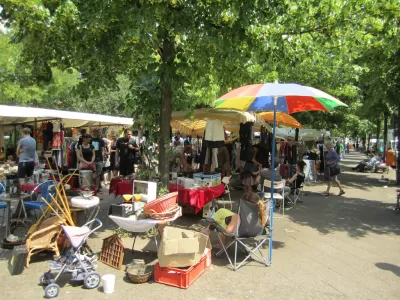With the support of its executive leadership, Adelaide, Australia's experimentalist city council has encouraged ephemeral projects to enliven streets. "Splash Adelaide" projects can even override council policy.

As CEO of Adelaide, Peter Smith presided over the city's distinct shift from staid and workaday to trendy. The city's placemaking program, Splash Adelaide, consists of "simple and inexpensive strategies for activating its public spaces. It started a few years ago with light-weight interventions such as shutting down a street to cars for a night, giving it over to food vendors and musicians, and giving those commuters a reason to linger after work."
Temporary rule-breaking has encouraged disruptive change: "Splash Adelaide projects could break any council policy, but not break the law [...] The idea was to 'consult by doing' and to get businesses and residents to think about shared spaces in new ways. Because the interventions were temporary and experimental, there was no huge risk."
Appropriately, Adelaide consulted with Gehl Architects to develop the plan. While Splash Adelaide has had success challenging "the notion that economic development happens through big, contentious projects," its open fairs and street retail have drawn criticism from heavily regulated traditional businesses.
FULL STORY: How Adelaide revitalized itself through ‘placemaking’

Planetizen Federal Action Tracker
A weekly monitor of how Trump’s orders and actions are impacting planners and planning in America.

Chicago’s Ghost Rails
Just beneath the surface of the modern city lie the remnants of its expansive early 20th-century streetcar system.

San Antonio and Austin are Fusing Into one Massive Megaregion
The region spanning the two central Texas cities is growing fast, posing challenges for local infrastructure and water supplies.

Since Zion's Shuttles Went Electric “The Smog is Gone”
Visitors to Zion National Park can enjoy the canyon via the nation’s first fully electric park shuttle system.

Trump Distributing DOT Safety Funds at 1/10 Rate of Biden
Funds for Safe Streets and other transportation safety and equity programs are being held up by administrative reviews and conflicts with the Trump administration’s priorities.

German Cities Subsidize Taxis for Women Amid Wave of Violence
Free or low-cost taxi rides can help women navigate cities more safely, but critics say the programs don't address the root causes of violence against women.
Urban Design for Planners 1: Software Tools
This six-course series explores essential urban design concepts using open source software and equips planners with the tools they need to participate fully in the urban design process.
Planning for Universal Design
Learn the tools for implementing Universal Design in planning regulations.
planning NEXT
Appalachian Highlands Housing Partners
Mpact (founded as Rail~Volution)
City of Camden Redevelopment Agency
City of Astoria
City of Portland
City of Laramie




























